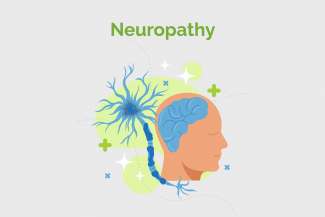Neuropathy (also known as Peripheral neuropathy) is a condition wherein the nerves of the body are damaged (from injury or disease) and thus fail to function normally. This affects the communication between the nerves and the brain. It is a fairly common condition and can affect people of all ages. It is however, more common in men and the elderly, and those with a family history of inherited neuropathy.

- Injury is the most common cause of nerve trauma from accidents, falls, medical procedures, recurring pressureon a nerve etc. Other causes for nerve injury include slipped discs, broken bones, arthritis, carpal tunnel syndrome, ligament/tendon problems etc.
- Diabetes is the foremost cause of polyneuropathy seen in 60-70% of diabetic patients. Studies show that high blood sugar levels slowly damage the nerves and the blood vessels that supply the nerves with oxygen. Poor glycemic control is the main cause and can be prevented by vigilant monitoring. Diabetic neuropathy is often non-symptomatic and may show up years later.
- Infections such as Herpes, HIV, Varicella-zoster, West Nile virus, Lyme’s disease, Cytomegalovirus can all attack the nervous system.
- Vascular problemsare all conditions that affect the blood and oxygen supply to the nerves leading to nerve impairment. These conditions mostly stem from narrowing or blocking of the blood vessels due to smoking, diabetes, atherosclerosis, hyperlipidemia and/or hypertension.
- Autoimmune diseases are where the body itself attacks the nerves and triggers neuropathy. Such diseases includeGuillain-Barre syndrome, Systemic Lupus erythematosus and Rheumatoid arthritis.
- Systemic diseases are conditions that affect the entire bodylike Kidney disorders, Amyloidosis, and hormonal imbalances.
- Vitamin deficiencies inVitamin B12 are a common cause. Imbalances in other vitamins such as B1, B6, B9 E and niacin can also affect nerve health.
- Toxins such as those present in industrial solvents and compounds like arsenic, lead, mercury, organophosphate pesticides etc. are all poisons that directly attack the nerve cells.
- Alcoholism (chronic and excessive use)causes loss of essential nutrients like thiamine from the body, thus leading to nerve damage in the extremities (arms and legs).
- Cancer can also cause certain neuropathies either by pressing on nerve fibers at the site of tumor growth or causing paraneoplastic syndrome which leads to widespread nerve damage.
- Medications such as certain Chemotherapy drugs (vincristine) and antibiotics (metronidazole, isoniazid). Radiation therapy can also cause nerve damage; neuropathy may occur long after radiation has stopped.
- Genetic caused neuropathies are rare and due to gene mutations, which can be inherited or new. Charcot-Marie-Tooth disease is one such genetic motor-sensory neuropathy.
Changed
09/Oct/2022
Community
Condition










